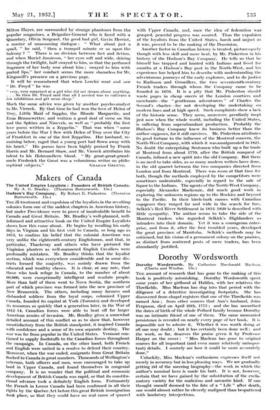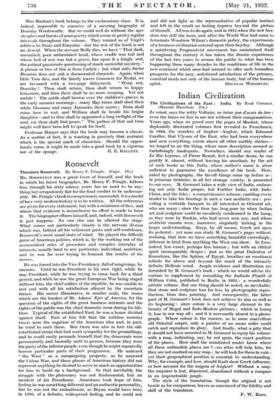Dorothy Wordsworth
Dorothy Wordsworth. By Catherine Macdonald Nadeau. (Chatto and Windus. 15s.) Tim amount of research that has gone to the making of this book is positively astonishing. Dorothy Wordsworth spent some years of her girlhood at Halifax, with her relatives the Threlkelds. Miss Maclean has dug into that period with the diligence of a detective investigating footprints. She has discovered from chapel registers that one of the Threlkelds was named Ann ; from other sources that Ann's husband, John Ferguson, died on April 20th, 1775 ; and she has unearthed the dates of birth of the whole Pollard family because Dorothy was an intimate friend of one of them. The same unwearied persistence is revealed on nearly every page of her book. It is impossible not to admire it. Whether it was worth doing at all one may doubt ; but it has certainly been done well ; and the work, so far, deserves the praise given it by Professor Harper on the cover : " Miss Maclean has gone to original sources for all important (and even many relatively unimpor- tant) details. I scarcely see how it could be mom accurately done."
Unluckily, Miss Maclean's enthusiasm expresses itself not merely in accuracy but in less pleasing ways. We arc gradually getting rid of the sneering biography—the work in which the author's nominal hero is made his butt. It is not, however certain that we have gained by the substitution of the excla- , matory variety for the malicious and sarcastic kind. If one thought oneself doomed to the fate of a " Life " after death, one would almost rather be cleverly maligned than bespattered with laudatory interjections. Miss Maclean's book belongs to the exclamatory class. It is, indeed, impossible to conceive of a sneering biography of Dorothy Wordsworth. But we could well do without the apo- strophes and bursts of semi-poetry which occur at pretty regular intervals throughout the volume. They remind us of Virgil's address to Nisus and Euryalus—but the rest of the book is not an Arm-id. When the servant Molly dies, we have " That dark, unwanted, poor unfurnished head, whose cradle was toil and whose bed of rest was but a grave, has upon it a kingly seal, the patient passionate questioning of much sorrowful mystery." A phrase or two of this is from Carlyle : but what suits Sailor Resarlus does not suit a documented chronicle. Again, when little Tom dies, and the family leaves Grasmere for Rydal, we are favoured with a two-page dithyramb. " Weep not, Dorothy ! Thou shalt return, thou shalt return to happy Grasmere, and then there shall be no more weeping. Yet not awhile ! The cattle shall browse over the children's graves in the early summer mornings ; many May-times shall shed their white blossoms and many Januaries their snows ; Dora shall come here to rest, and William shall lie beside his bright daughter—and to thee shall be appointed a long twilight of the soul, ere thou shalt find peace." The pathos of that sad time might well have been left to speak for itself.
Professor Harper says that the book may become a classic. As a matter of fact, it is wanting in precisely that restraint which is the special mark of classicism. Should the oppor- tunity come, it might be made into a good book by a vigorous





































 Previous page
Previous page